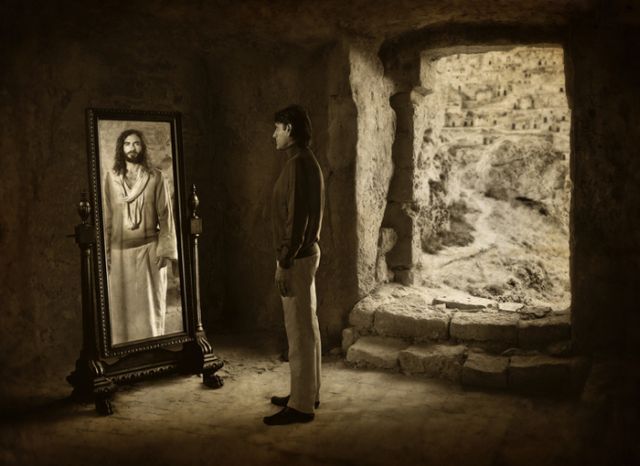“…the glorious Paul, taught you when he said in his epistle that you should mortify the body and destroy self-will, knowing how to keep a rein on the body and to macerate the flesh whenever it wishes to combat the spirit. But the will should be dead and annihilated in everything, and subject to My will.
“And the slaying of the will, the virtue of discretion renders to the soul as its due. Discretion brings to the soul hatred and disgust of its own acquired by self-knowledge. This is the knife that slays and cuts off all self-love founded in self-will. These then are the ones who give me not only words but manifold works, and in these I (the Lord) take delight. –Catherine of Siena ‘Little Talks With God’
Starting in on Catherine of Siena writing, I was comforted to find words fitting nicely into current reflections. The idea of self-knowledge propelling into the mastering of self-will, thus the means for greater contemplation, settles upon convictions, comforting and soothing. The Lord speaking to Catherine mentions self-love arising from self-will, yet I extend the idea to withdrawing from ourselves. Self-will, centered within reasoning and the manipulating of thought, traps one within insecurity and delusion, identity dominates, the need to justify and defend one’s ways manifests as a preoccupation. The self-consciousness created by one lacking self-knowledge perverts spiritual insight, seeking to justify and define God in one’s life. One is always explaining God. Unable to advance in contemplation centered upon faith, hope, and charity, an individual consumed by their own life is always seeing signs, identifying grace, or its absence, in their life and the lives of others. Whenever someone proclaims the events of their life as grace I become nervous. I find that usually those approaching the spiritual through free will are always declaring grace working in their life, or seeking signs of grace absent in the lives of others, especially those they oppose. Maybe they are right. Maybe they are wrong. Maybe sometimes they are right and sometimes they are wrong. It does not matter. The important thing is the self-conscious focus upon grace puts them in the driver’s seat, allowing them to dictate what God is doing and not doing. They are speaking for God. Their efforts strip God of His sovereignty, removing mystery and the unknown potentialities of the Master of All Reality. It may be fine for those playing on lower spiritual levels, however for the contemplative the proclaiming of grace is a luxury they cannot afford. Deeper and darker waters are sought. Once again ‘The Book of Privy Counseling’ provides insight: Grace…is so high, so pure, and so spiritual that our senses and emotions are actually incapable of experiencing it. Once an apophatic understanding of the magnitude of grace, a Divine gift of unknowable dimension, is formed, we comprehend the ridiculousness of proclaiming events in our life being gifts from God. We do not seek misfortune in those we do not like with the hope of identifying the absence of grace. We have ceased seeking grace. We understand, in truth, when grace is proclaimed, it is an attempt to manipulate truth in order to justify wants and desires. Once we are moving beyond ourselves, passing through and into a sublime adoring of God within a penetrating self-knowledge, words proclaiming His work within our lives finds no voice. We do not focus upon our lives. We do not focus upon the lives of others. Centered within mystery, the smallness of our being in the image and likeness of God, abandoning speculation and attempts at wisdom, we open ourselves to the contemplative magnificence of untold potentialities. I think of the ending of Job:
Then Job answered the LORD: “I know that thou canst do all things, and that no purpose of thine can be thwarted. ‘Who is this that hides counsel without knowledge?’ Therefore I have uttered what I did not understand, things too wonderful for me, which I did not know….I had heard of Thee by the hearing of the ear, but now my eye sees Thee; therefore I despise myself, and repent in dust and ashes.” …the LORD said to Eli’phaz the Te’manite: “My wrath is kindled against you and against your two friends; for you have not spoken of Me what is right, as my servant Job has.
The men of good will who attempted to identify and explain the working of God within the life of Job were harshly scolded, receiving the wrath of God. Striving for perfection, a contemplative advancing deeper rejects the notion of ascertaining the ways of God. Grace proclaimed is easily seen as nothing more than a manipulating means of justification. Attempts at defining God are abandoned. Silence and stillness are more than a method of prayer. ‘The Book of Privy Counseling’ provided the means to confidently identify the grace of contemplation being gifted, yet the realization ends with the call. Once properly discerned, contemplative work begins. Once the call is distinguished work becomes dominant, that is, contemplative prayer supersedes reasoning, the need to define and identify God or His works. Continuing seamlessly back to the Catherine of Siena quote and ending with words of the Lord to the saint: “And then I said that I desired few words, and many actions. By the use of the word ‘many’, I assign no particular number to you. That is, because the affection of the soul, founded in love, which gives life to all the virtues and good works, should increase infinitely.








Recent Comments